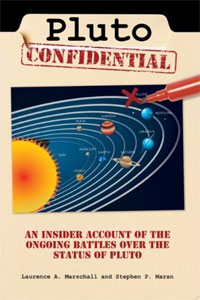Review: The New Solar Systemby Jeff Foust
|
| Much of Pluto Confidential is actually a history of other planetary (or pseudo-planetary) discoveries and the debate and controversies that surrounded them. |
That doesn’t mean that the controversy has died down, nor the interest in the topic from publishers. Several books have covered the “demotion” of Pluto in whole or in part, the latest of which is Pluto Confidential by astronomers Laurence Marschall and Stephen Maran. The two astronomers come from different sides of the issue—Marschall attended the Prague meeting and voted for the resolutions, while Maran opposed them—but provide a “fair and balanced” overview of the topic and its historic significance instead of a point-counterpoint debate.
While the subtitle describes Pluto Confidential as an “insider account” of the Pluto debate, much of the book actually is a history of other planetary (or pseudo-planetary) discoveries and the debate and controversies that surrounded them. Those controversies varied over time: in the case of the William Herschel’s discovery of what became known as Uranus, it was what to name the planet; in the case of Neptune, it was who should get credit for the discovery; and in the case of the hypothesized inner planet Vulcan, it was whether the planet actually existed (it didn’t). The takeaway here is that such controversies are hardly unique to the Pluto debate and that the current dispute is, relatively speaking, pretty tame and civil.
Another key point from the book is that while the debate over Pluto’s planetary status is considered to be relatively recent—within the last decade or so—the question of whether Pluto should be considered a planet is actually much older. Shortly after Clyde Tombaugh discovered Pluto in 1930, UCLA astronomer Frederick Leonard suggested that it might only be the first in a series of “ultra-Neptunian” objects—a rather prescient statement, coming decades before even the prediction of the existence of the Kuiper Belt. The first “modern assaults on Pluto’s status”, the authors claim, date back to 1980 and remarks made by astronomer Brian Marsden at a conference about Pluto in New Mexico. (What exactly Marsden said to trigger the debate isn’t quoted in the book.) In 1992, David Jewitt, co-discoverer of the first Kuiper Belt object (excluding Pluto), said that Pluto was “misleadingly” given planetary status for “socio-scientific” reasons, including that it appeared to validate what turned out to be a faulty prediction for a “Planet X”.
| With some holding out hope that the IAU will revisit its 2006 decision at a future triennial meeting, it appears that the final chapter in Pluto’s planetary saga has yet to be written—figuratively or literally. |
While the book’s title might lead some to think it has the inside scoop on the deliberations and debate that brought the topic to a head in 2006, there is very little in the book that hasn’t been previously reported (although they did talk to some of the astronomers involved), and the whole debate and controversy is dispatched in the first 30 pages of the book before embarking on a history of other planetary controversies. The authors revisit the controversy in the final chapter, with each providing a brief statement on their views. Maran believes that, in the end, Pluto and objects like it will be considered members of a specific class of planets. Marschall, though, thinks that the controversy will eventually fade into a “historical footnote”, although he suggests that IAU might have been better off avoiding making a definition of the term altogether—something he believes the IAU only got involved with in the first place because of the question of how to name the large trans-Neptunian objects that had been discovered in recent years.
Marschall sees a bright side in the controversy surrounding Pluto’s reclassification: a “bonanza for astronomy” given all the public attention and all the lessons taught in schools in the aftermath of the IAU’s decision. (That has not gone unnoticed elsewhere: in their recent book Unscientific America, science communicators Chris Mooney and Sheril Kirshenbaum use the public reaction to the IAU’s decision as an argument to advance their thesis that scientists need to do more themselves to properly communicate science to the general public.) For whatever reason, the subject has engendered strong public reaction, and concomitant interest from publishers: Pluto Confidential is neither first book on the topic nor the last—The Case for Pluto, by MSNBC.com science editor Alan Boyle, is due out this fall. With some holding out hope that the IAU will revisit its 2006 decision at a future triennial meeting (the 2015 General Assembly, if the IAU sticks to its current schedule of August meetings, would take place within weeks of the flyby of Pluto by NASA’s New Horizons spacecraft, interestingly enough), it appears that the final chapter in Pluto’s planetary saga has yet to be written—figuratively or literally.
